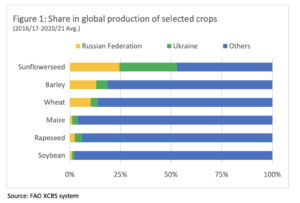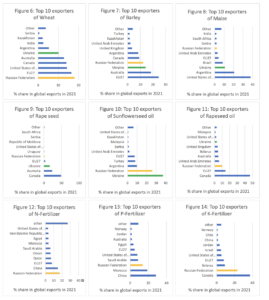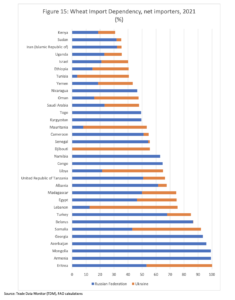President Donald Trump on Friday signed an executive order temporarily expanding the amount of beef the U.S. can import from Argentina, a move the White House says is aimed at…
“The Impact (on Global Markets) is Direct, Dramatic and Large. And it Continues,” Ukraine’s Ag Minister on Ag Exports
Reuters writer Natalia Zinets reported yesterday that, “Ukraine’s new agriculture minister Mykola Solskyi on Saturday said Ukraine’s ability to export grains was getting worse by the day and would only improve if the war with Russia ends.
“Speaking in a televised briefing, Solskyi said Ukraine, one of the world’s top grain producers, would normally be exporting 4-5 million tonnes of grain per month – a volume that has fallen to just a few hundred-thousand tonnes.
‘The impact (on global markets) is direct, dramatic and large. And it continues. Every day the situation will become more and more difficult,’ he said.
And today, Reuters writer Pavel Polityuk reported that, “Traders have exported the first supplies of Ukrainian corn to Europe by train as the country’s sea ports remain blocked due to the Russian invasion, APK-Inform agriculture consultancy said on Sunday.
“Ukraine is a global major grain grower and exporter and almost all its exports have traditionally been shipped from its Black Sea ports. Monthly grain exports exceeded 5 million tonnes before the war.”
“Traders and agriculture official have said Ukraine, which still has significant volumes of grain in stock, may start exporting by train via its western border,” the Reuters article said; adding that, “Ukrainian transport authorities have said as much as 600,000 tonnes of grain per month could be exported by trains from Ukraine to Europe.”

And Bloomberg writer Abdel Latif Wahba reported on Saturday that, “Kazakhstan is looking to establish a logistics center at an Egyptian Red Sea port that would help it ship its grains and other foodstuffs to Africa, Egypt’s agriculture ministry said.”
Also on Saturday, Financial Times writer Alan Beattie reported that, “Governments are risking a repeat of mistakes in previous food crises by imposing export controls amid spiralling commodity and energy prices, the head of the World Trade Organization [Ngozi Okonjo-Iweala] has said.”

The FT article stated that, “‘I do hope we have learned something’ from the previous global food crisis in 2007-2008, Okonjo-Iweala said, referring to a period in which problems were caused by droughts in key wheat and rice-producing countries, along with a surge in the cost of energy. ‘The signs we see now don’t show that learning very much, because we’re having the same situation of spiking food prices, spiking energy prices and an emerging spiral.’
“‘We should try not to compound the issues by having export restrictions put in place that may encourage others to put on their own export restrictions,’ she said. Governments with surplus stocks in products like vegetable oils and grains should release them on world markets, she said, although she declined to name specific countries.
“Okonjo-Iweala, formerly Nigerian finance minister and World Bank managing director, said only around 12 WTO member countries had so far imposed export restrictions to keep food at home, which they are permitted to do under a loophole in WTO rules.”
See our updated information note on the impacts on food security of the war in Ukraine https://t.co/j3Q23qKAEH
— Maximo Torero (@MaximoTorero) March 26, 2022
And the Food and Agriculture Organization (FAO) of the United Nations recently released an updated information note on the impacts on food security of the war in Ukraine.

In part, the FAO report stated that, “The Russian Federation and Ukraine are among the most important producers of agricultural commodities in the world. Both countries are net exporters of agricultural products, and they both play leading supply roles in global markets of foodstuffs and fertilisers, where exportable supplies are often concentrated in a handful of countries. This concentration could expose these markets to increased vulnerability to shocks and volatility.
In 2021, either the Russian Federation or Ukraine (or both) ranked amongst the top three global exporters of wheat, maize, rapeseed, sunflower seeds and sunflower oil, while the Russian Federation also stood as the world’s top exporter of nitrogen fertilizers, the second leading supplier of potassium fertilizers and the third largest exporter of phosphorous fertilizers.
The FAO report noted that, “Current indications are that, as a result of the conflict, between 20 and 30 percent of areas sown to winter crops in Ukraine will remain unharvested during the 2022/23 season, with the yields of these crops also likely to be adversely affected. Furthermore, considerable uncertainties surround Ukrainian farmers’ capacity to plant crops during the fast approaching spring crop cycle.”

“In order to prevent or limit the conflict’s detrimental impacts on the food and agricultural sectors of Ukraine and the Russian Federation, every effort should be made to keep international trade in food and fertilizers open to meet domestic and global demand. Supply chains should be kept fully operational, including by protecting standing crops, livestock, food processing infrastructure, and all logistical systems,” the FAO report said.





